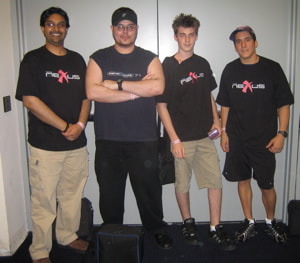|
When I saw Feroze Ramcharan bearing his usual smile, I went up and greeted him, as always. Ramcharan and I go way back, and as one of the game’s more productive Level 3 judges, he’s highly recognized for his contributions to the game. At the same time, he’s often the source of witty observation and general hilarity, so he’s always worth talking with. My first question for him today was about what he was wearing. Normally wearing some sort of polo shirt or an elegant button-up long-sleeve shirt, today Ramcharan was sporting a big black t-shirt with the words “Team Nexus” written in bold red text. “It’s our team!” he grinned. He was suddenly flanked by fellow Level 3 judge Franklin Debrito and star player John Jensen, and I knew that this needed some coverage. A team led by well-known Level 3 judges and featuring one of the world’s top four players? Awesome. I got a chance a short way into Round 1 to speak with Team Leader Franklin Debrito, possibly one of South Florida’s most locally recognizable faces, but a generally unknown duelist on a national level. He’s the kind of person who deserves more face time, and seems just like the kind of person Ramcharan would hang out with. Sharp, funny, and with a clear sense of the morals that guide his dueling habits, Debrito has developed a definite sense of where he wants the team to go. But first—the lineup. Four members of the ten-man group were present today: Debrito, Ramcharan, Jensen, and Miguel Garcia. Members not present included Paul Lynn, Glenn Lightfoot, Mitchell Rabsatt, Val Bakalar, and brothers Shawn and Gary Kuchta. My first question for them concerned who they were playing for. Most big teams are sponsored with funding and cards, and team profiles are a team’s chance to represent for the store promoting them. I asked what store they represented. “South Florida” said Debrito with a smile, leaning back a bit in his chair. I blinked at him for a moment. “Is that a store?” “No, that’s half of the state. We pretty much roam all of the local stores. It’s a community, not a store, so we try not to set roots. We actually declined sponsorship. We figure it would be a lot easier to have a full say in our actions than let someone else be able to dictate what we do. So we went with that, even though we might not get to travel as much as other competitors.” It was the first of several things that Team Nexus does differently from other big-name teams. Most Yu-Gi-Oh! teams, even greats like Team Comic Odyssey, come together on lazy days spent among friends. I asked if that was the case for Nexus, and sure enough it was. “Pretty much” confirmed Debrito. “I was sittin’ around one day and I was like ‘Hey! We should form a team!’ And everyone around me was like, ‘Hey, that’s a great idea!’ So we formed a team!” It was a short story that was punctuated by a burst of laughter from Debrito. “It just sort of came together—we all had the same ideas and attitude towards the game, so we decided we could have more fun as a team.” “Basically, when I first started putting the team together I wanted a team that could have fun, play competitively, but not have it be 100% about winning. We still want there to be a fun aspect of the game. A lot of people locally want to join up, but we don’t accept them, cause their minds are only on the prizes. Everyone on the team is pretty modest, though we know our stuff. We’re not interested in just winning, so our ranks are a lot thinner than they could be.” “Winning is nice, don’t get me wrong, but if it doesn’t come once then we’ll just do it next time.” A big issue in the development of teams right now is how exactly team members support each other. What makes it worth being part of that team? Issues like the splitting up prizes are often some of the most complicated, and while some teams use arcane systems to determine who gets what, the community aspect of Team Nexus has really given such things a shove to the back seat. “It really all depends, like, on the local tournaments we don’t do it [worry about splitting up prizes]. Usually we just help each other out. With something as big as this, the SJC, we haven’t really discussed it. Attending this was a last minute thing. For SJC Orlando, though, we did have a prize split set up for the group.” “Myself and Feroze, we pretty much have every card in the game, minus Cyber-Stein, Kanaan the Swordsmistress, and the promo Card of Sanctity. We trust one another, so, we loan stuff out back and forth. We just support each other wherever we can. I mean, eventually we’ll have an official prize split thing set up, but, because of our attitude it’s not on our number-one thing to do right now.” Given the team’s morally admirable approach, I was tempted to ask what they thought of other big teams, many of which are not nearly so respectful. “Honestly, we really don’t think down on any teams. Team Comic Odyssey, we’ve played them before, at least individually. They’re really cool and all. Nice people. We haven’t played Team Savage or anything, but all the big teams seem able to back up what they say.” Since Debrito himself hasn’t had a great deal of exposure, I asked him about his involvement in the game, most specifically how he got started. “I got in the game primarily for competition. A friend of mine brought a starter deck over, was bragging about it. So I picked one up just so I could beat him, and it all escalated. That was back in the day of Legend of Blue-Eyes White Dragon.” He went on to discuss the history of the team a bit. “Paul started playing recently, Val has only been playing since Ancient Sanctuary, but most of us have played for ages. Val used to play other games at the store we frequent the most, but he switched to Yu-Gi-Oh! and has been winning ever since.” None of the team’s members were playing Thousand-Eyes Restrict Lockdown. Everyone was running Chaos, with the exception of Ramcharan, who was playing a Machine Gravity Bind deck. I was curious as to why, knowing that the Nexus players are extremely good and thinking that an entire team avoiding what might be the best deck in the format makes a clear statement. Indeed, Debrito had a statement to make that had motivated their decision. “We don’t netdeck. That’s the plain and simple [truth] of it. The ideas we have aren’t always original, but obviously, when a new set comes out people have thought about it already. We playtest, playtest, and playtest, and we play what we find works.” He grinned. Teams often have closely-guarded tech, so I needed to know what Nexus’s was: “The fact that nobody knows us!” said Debrito, suddenly a bit excited but at the same time laughing. “That’s it! The element of surprise!” He chuckled. “The team is really new, it’s been around for only a month or so. John is the best on the team—he’s ranked third or fourth in the world. Because he doesn’t represent himself online and only plays in local tournaments, we’ve got this huge element of surprise.” With ten members that are all qualified for Nationals, Team Nexus could become a force in the game over the next few months. Eight members have committed to attend the year’s final showdown next week, and with numbers and skill that outrank most teams in top-level contention, they’ve got a strong chance at making an impact. If they do, it would certainly be for the better. Metagame.com (2005) This article was originally written by Metagame.com, what was formerly the official website for large Yu-Gi-Oh! tournament coverage. It has been preserved by GoatFormat.com so that players can learn from this historical tournament coverage.
1 Comment
5/16/2023 06:30:01 am
This team shirt is a common thing now, and Ramcharan and his team also have the same t-shirt, giving everyone a sense of belonging. People should read it, and I have also thoroughly reviewed it.
Reply
Leave a Reply. |

Categories
Upcoming Live Events (Goat Grand Prix) Tournament Coverage/Deck Lists Goat Grand Prix Application Hall of Fame Play Online Strategy: Advanced Strategy: Beginner Tier List Archives
July 2024
|
Copyright © 2015









 RSS Feed
RSS Feed